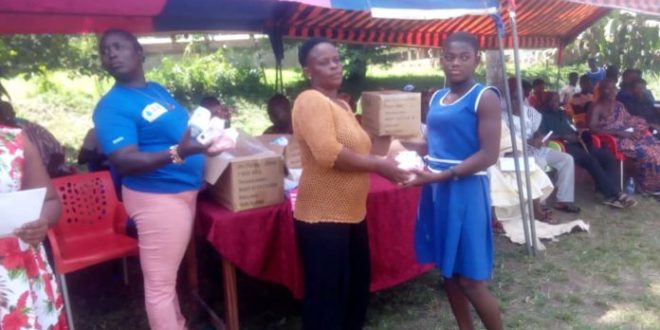Accessing Menstrual Management Products in rural parts of Ghana is still a challenge forcing many teenage girls to sometimes exchange sex for Sanitary pads.
The high prevalence of poverty in rural parts of Ghana continues to worsen the plight of young girls who in desperate attempts to have menstrual hygiene products fall into the hands of male sexual predators such as Commercial Motorbike riders known locally as Okada who enter into a sexual relationship with these girls in return for paltry financial assistance.
Parents failure to buy Sanitary Pads for their menstruating Children and lack of menstrual hygiene friendly facilities in Basic Schools have been linked to high absenteeism among school girls in Basic Schools and Teenage Pregnancy.
It is estimated that globally 800 million women menstruate daily, however, many of these women in developing countries such as Ghana struggle to have access to sanitary products compelling them to use unhygienic materials to manage their menstrual flow.
A 15-year-old Ama, in Mangoase, a community in Akuapem North Municipality confided that “my parents don’t buy it for me, whenever I ask my mother she said she doesn’t have money so my boyfriend helps me to buy”.
She shyly nodded her head in affirmative when asked if she has been having sex with her boyfriend.
Another schoolgirl also recounted her struggle for sanitary pads that “whenever I menstruate because I don’t have sanitary pads, my mother gives me a piece of rag to use which I don’t feel comfortable so I find my own means to get it.”
Anthony Gbagba, a Circuit Supervisor of the Ghana Education Service in Mangoase said the phenomenon is worrying, “the parents here could not afford the Sanitary pads for their children, they resort to the local ways be providing rags to the children to control themselves during their menstrual period.”
However, Nana Kofi Sarkwa, Odikro of Mangoase believes lack of knowledge on menstruation on the part of Fathers, in particular, is the cause.
“It is not about affordability but I see it as ignorance on the part of the fathers. You know, previously when somebody menstruates the person is driven out of the House so they see it as filth so if he has a daughter and she is in that position, the man sees it as filth so the lady shouldn’t come near him”.
Lilian Bruce, a Gender Activist with Plan International Ghana said the situation is disheartening but hopeful misconceptions and parents mindset on the subject matter will be changed through the ongoing implementation of Rural Water, Sanitation and Hygiene (RWASH) Project by the NGO.
“It is because parents really don’t care about the menstrual thing on the girls, it turns to take them away from school in terms of absenteeism because she doesn’t get support from parents to manage the blood flow. I will also say that has been the main cause of teenage pregnancy in our communities. They turn to ask money or do other menial jobs.”
These were revealed during Menstrual Hygiene Management and Education Program , and Free Distribution of Sanitary pads to schoolgirls in Mangoase and Korkormu Communities in the Akuapem North Municipality of the Eastern Region as part of the implementation of RWASH Project by Plan International Ghana
The Eastern Regional Manager of Plan International Ghana, Kofi Adade Debrah admonished parents to make it a monthly responsibility to provide Sanitary pads for their children.
He said, the use of rags for management of menstrual flow is unhygienic and archaic, and does not provide self-confidence for girls to go about their normal academic duties while menstruating.
The 2,247,500 Euros Plan Germany Funded RWASH project is being implemented in Akuapem North Municipality and Okere in the Eastern, Agona East District in Central and Afadzato South District in Volta regions.
Teenage Schoolgirls in the above beneficiary Districts are being supplied free sanitary pads, given menstrual management education, and providing girl-friendly hygiene facilities such as changing rooms in their various schools to enhance menstrual hygiene management to curb the “menstruation induced absenteeism”.
Above all, the RWASH project is also expected to increase access to gender-friendly water, sanitation facilities to promote hygiene for some 32,000 beneficiaries in the aforementioned districts at its completion in 2021.
Source: Ghana/Starrfm.com.gh
 Home Of Ghana News Ghana News, Entertainment And More
Home Of Ghana News Ghana News, Entertainment And More




